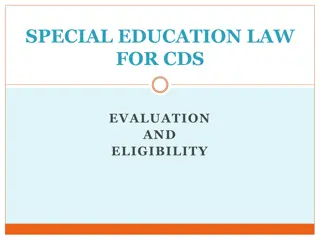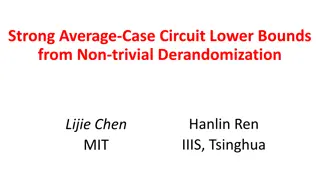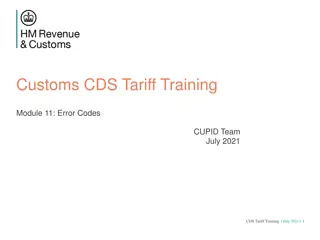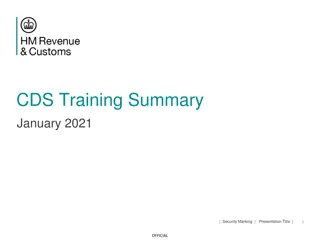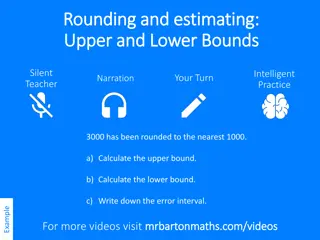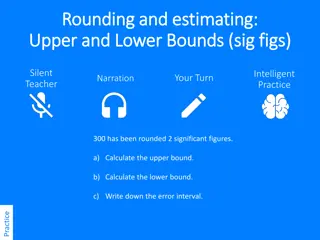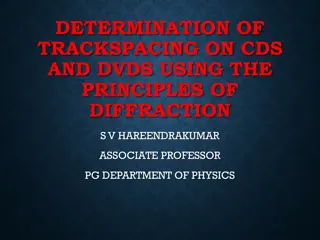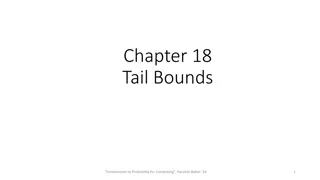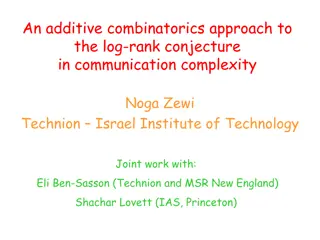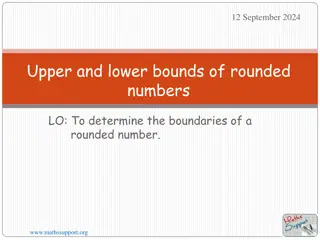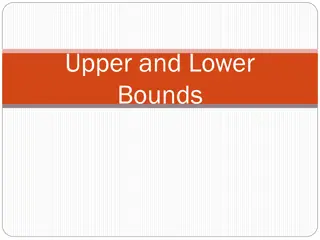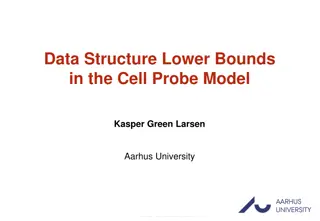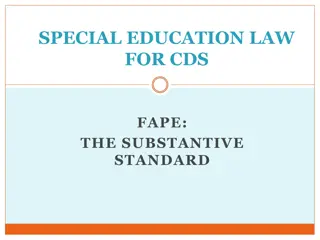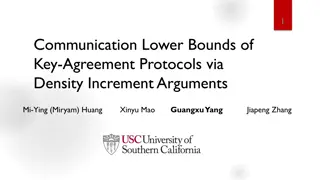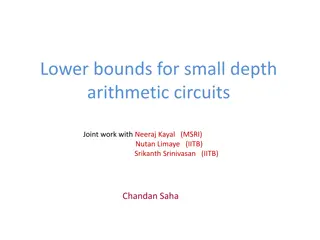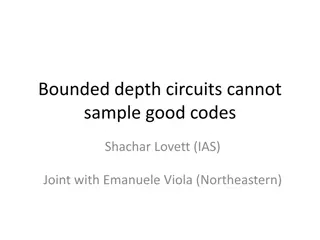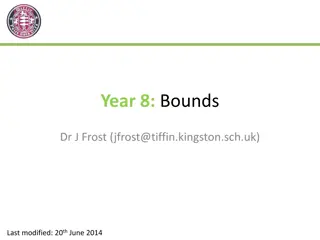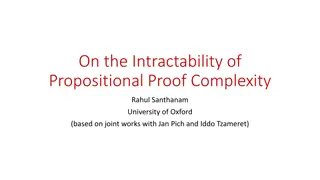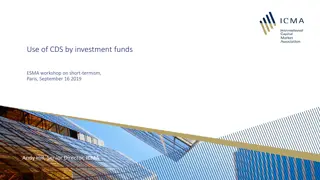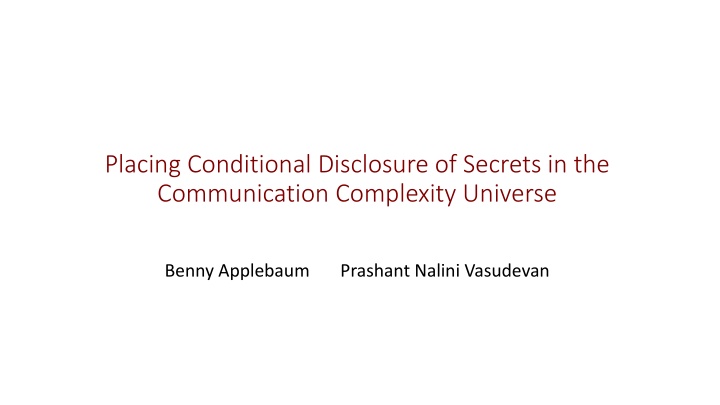
Placing Conditional Disclosure of Secrets in Communication Complexity Universe
Explore the concept of placing conditional disclosure of secrets in the communication complexity universe with insights from Benny Applebaum and Prashant Nalini Vasudevan. Discover connections and applications in the cryptographic field, lower bounds on CDS, and more in this informative read.
Download Presentation

Please find below an Image/Link to download the presentation.
The content on the website is provided AS IS for your information and personal use only. It may not be sold, licensed, or shared on other websites without obtaining consent from the author. If you encounter any issues during the download, it is possible that the publisher has removed the file from their server.
You are allowed to download the files provided on this website for personal or commercial use, subject to the condition that they are used lawfully. All files are the property of their respective owners.
The content on the website is provided AS IS for your information and personal use only. It may not be sold, licensed, or shared on other websites without obtaining consent from the author.
E N D
Presentation Transcript
Placing Conditional Disclosure of Secrets in the Communication Complexity Universe Benny Applebaum Prashant Nalini Vasudevan
Conditional Disclosure of Secrets [GIKM00] ?: 0,1? 0,1? {0,1} ?-Correctness: If ? ?,? = 1, then for any ?, Secret ? Pr ? ?,?,??,?? = ? > 1 ? ? A B Randomness ? ?-Privacy: If ? ?,? = 0, then for any ?, ?? ?? ??? ?,? ; ??,?? < ? Communication: ??+ |??| C ?,? Randomness:|?|
Connections and Applications Host of cryptographic applications: A minimal model of multi-party computation. Attribute-Based Encryption. [Att14,Wee14] Secret-sharing for certain graph-based access structures. [LVW17,LV18] Light-weight alternative to zero-knowledge proofs in some settings. [AIR01] Data privacy in information-theoretic PIR. [GIKM00]
The Story So Far Upper bounds: Communication 2?( ? log ?) for any predicate on ?-bit inputs [LVW17] Communication ?(?) for size-? branching/span programs [IW14,AR16] Lower bounds: Extend to more predicates ? ?(1) for perfect CDS [AARV17,AHMS18] Best non-explicit bound 2? (??) for some 0 < ? < 1, but non-explicit (log?) for general CDS [GKW15]
This Work Lower-bounds on perfect and imperfect CDS in terms of communication complexity measures pcCDS(f) (coNP(f)) ppCDS(f) (PP(f)) CDS(f) max(AM(f), coAM(f))c
Perfectly Correct CDS coNP ?: 0,1? 0,1? {0,1} ? A B ? ? A B ? ? ? Proof that ?? ?? ? ? C C ? ?,? = 0 ?,? ?,? ? ?,? = 1 ?0,?1 that lead to same (??,??) for ? = 0 and ? = 1 To prove ? ?,? = 0, send ? = (?0,?1) coNP(?) 2 |?|
Perfectly Correct CDS coNP ?: 0,1? 0,1? {0,1} ? A B ? ? Lemma: ? Randomness in CDS can be sparsified Proof that ?? ?? by sub-sampling. That is, C ? ?,? = 0 ?,? ? ??+ ??+ ?(log ? ) Proof sketch: Pick a set ? of ? s that preserve distributions of (??,??). Such ? exists of size roughly 2??+ ??. Use log( ? ) random bits to index into this set. ? ?,? = 1 ?0,?1 that lead to same (??,??) for ? = 0 and ? = 1 Similar to Newman s theorem. To prove ? ?,? = 0, send ? = (?0,?1) coNP(?) 2 |?|
Our Lower Bounds AM coAM coAM PP pcCDS(f) (coNP(f)) coNP ppCDS(f) (PP(f)) General CDS CDS(f) max(AM(f), coAM(f))c Perfectly Correct CDS Perfectly Private CDS Perfect CDS
Other Results Bounds on trade-offs between sizes of ?? and ??, in terms of one-way communication complexity. Equivalence of variants of CDS and SZK communication complexity.
Summary We related complexity of CDS to various communication measures. Imply better non-explicit lower bounds and tight bounds for several predicates. Super-logarithmic explicit lower-bounds on imperfect CDS? If you wish to lower-bound AM complexity, do this first! Super-linear lower-bounds on perfect CDS? Even a non-explicit bound better than 2?? Upper bounds, even for specific classes? Barriers to the above? CDS complexity of specific predicates like Disjointness?
CDS and Statistical Difference Randomness ? ?-Correctness: If ? ?,? = 1, then for any ?, ? ? A B Secret ? Pr ? ?,?,??,?? = ? > 1 ?? ?? 0 ; ??,?? ?,? 1 ??,?? ?,? > 1 2? C ?,? ?-Privacy: If ? ?,? = 0, then for any ?, Distribution of (??,??): input (?,?), ? = 0: ??,?? ?,? input (?,?), ? = 1: ??,?? ?,? ??? ?,? ; ??,?? < ? 0 1 0 ; ??,?? ?,? 1 ??,?? ?,? < 2?

